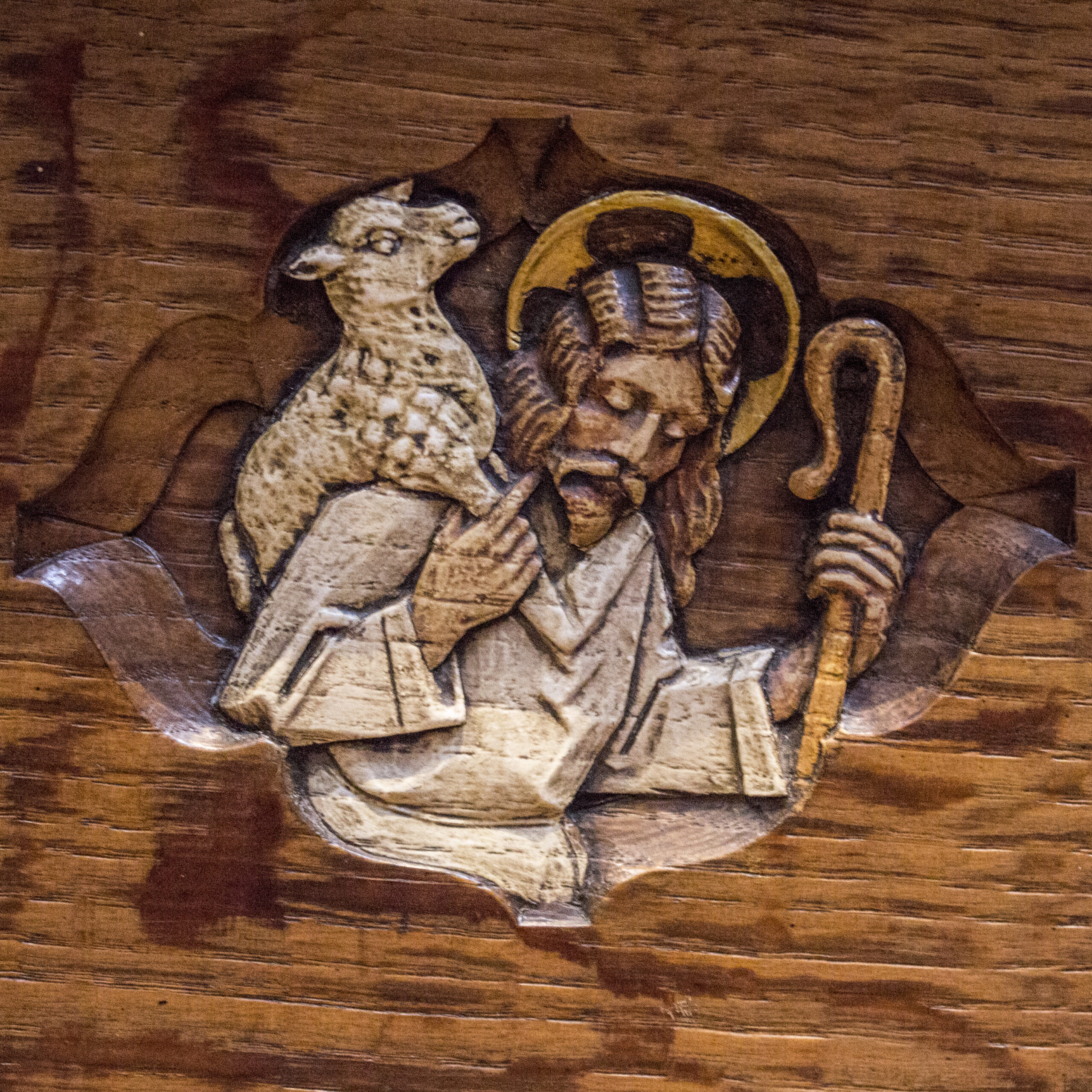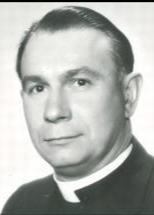Co-missioners,
Steve Hitchcock is a member of our editorial team. Some months ago, he found today’s item in our online library and thought it worthy of fresh attention, demanding though it is. The team agreed.
The author of the piece is the late Robert C. Schultz (1928-2018). Those who knew him as a friend and colleague called him Bob. Bob graduated from Concordia Seminary, St. Louis in the early 1950’s and was among a handful of students—Ed Schroeder was another—who immediately went to Germany to earn doctorates. Bob received his in Erlangen, where he studied under Werner Elert. On returning to the U.S., he joined the theological faculty at Valparaiso University. He would later teach at St. John’s University in New York, at the Lutheran Theological Southern Seminary in South Carolina, and at the Northwest Theological Union in Seattle. Along the way he studied Pastoral Care and Counseling at the Menninger Foundation in Kansas. His scholarly achievements include translations of Paul Althaus’s Theology of Martin Luther and The Ethics of Martin Luther. He was working on a fresh translation of Werner Elert’s The Christian Faith when he died. We’re grieved to say that this remains unfinished.
Bob’s profound commitment to the distinction between Law and Gospel can be seen in an essay by that name that was published in the October, 1961 issue of the old Concordia Theological Monthly. That this issue was devoted to honoring C. F. W. Walther says much about the high regard Bob was held in as a young, upcoming theologian.
Bob prepared today’s essay for a workshop he led at the First Crossings Conference in 2007. The topic he addresses—spiritual care—resurfaced in one way or another at each of our last three conferences. This too is a reason for looking again at what he said back then.
As suggested above, Bob is not the easiest of writers to follow. So be it. He rewards the effort of doing so, as we trust you’ll discover. We have, here and there, abridged the piece as first presented to make it more widely accessible.
Peace and Joy,
The Crossings Community
__________________________________________________________________
Law and Gospel in Spiritual Care
by Robert C. Schultz
In the medical community ‘spiritual care’ is frequently distinguished from physical medicine or care of the body, psychiatric medicine or care of the mind, as well as pastoral care. The latter is still permitted in hospitals between pastors and chaplains serving a patient who requests their service or in a religiously-affiliated hospital in which the patient at least does not refuse it. Spiritual care is often provided with the assurance that the provider will not proselytize.
This understanding of ‘spiritual care’ presupposes that it may be provided by Christians and non- Christians to both Christians and non-Christians. The question then is whether the Lutheran distinction between law and gospel is relevant to the practice of spiritual care in which the practitioner has agreed not to introduce the gospel. Do the theological perspectives underlying Lutheran pastoral care raise questions that are relevant within the limitations of the practice of spiritual care? Are the questions raised by spiritual care relevant to our use of the distinction between law and gospel in pastoral care?
These are important questions to pastors because members of our congregations will often receive spiritual care independent of our pastoral care and even without our awareness. In such situations, we will probably be most helpful to our members of we are able to think of this spiritual care as a positive resource in our pastoral work.
I think that the distinction between law and gospel is a primal distinction in Lutheran theology. I follow the practice of Lutheran theologians who understood the Scripture as the norm but neither the sole source nor judge of doctrine. I follow their usual practice of beginning a systematic discussion of Lutheran theology and/or its usefulness in pastoral work by clarifying their understanding of the distinction between law and gospel. There are other forms of Lutheran theology which are validly Lutheran even though I think they are less useful. Specifically, as a would-be systematic theologian, I distinguish law and gospel in every locus of theology.
I use the distinction between law and gospel to identify useful information, to organize this information, and to evaluate my work. In this, I acknowledge my use of approaches to systematic theology developed by Werner Elert.
Werner Elert’s analysis of 19th century theology (Der Kampf um das Christentum) describes an oscillation in the relationship between theology and culture, sometimes more, sometimes less integration. The danger in diminishing integration is that theology separates itself from culture in issues related to the law and under-emphasizes those elements which provide meaningful analogies to the gospel. When we permit that to happen, we confuse the dialectical distinction between law and gospel with the differences between theology and culture, between the Lutheran Ethos and the wide variety of cultures in which Lutherans live.
My understanding of the Lutheran distinction between law and gospel is that it is a dialectical distinction. Law and gospel can neither be described nor proclaimed at the same time. The task of describing them separately is the function of Lutheran systematic theology. The task of distinguishing law and gospel in proclamation and pastoral care is the function of Lutheran pastoral care. The description of the individual and communal life that results when law and gospel are both distinguished in the church’s ministry and teaching is the function of the Lutheran ethos.
Article V of the Formula of Concord distinguishes law and gospel in terms of their effects or of what the Holy Spirit uses them to do. These are operational definitions. The pastor can know the intention of the proclamation but can only evaluate whether law or gospel has been proclaimed by observing the results. In distinguishing law and gospel, process is more important than content. Distinguishing law and gospel in ministry is more important and more difficult than distinguishing it in systematics.
Because Lutheran pastors are usually to some extent concerned to distinguish law and gospel, they may find interaction with practitioners of spiritual care very useful. As presently defined, spiritual caregivers do not introduce new content into the process but ideally work with the content that is already available. As pastors, we can learn a great deal about the relative importance of process and content from working within the strict limitations of ‘spiritual care.’ Lutheran pastors ordinarily have clear understandings of the content of their proclamation. Conversation with spiritual caregivers may help achieve a similar clarity about process.
The discipline of ‘spiritual care’ can also equip us to interact more effectively with people who think of the human being in monistic rather than dualistic terms. For them, the concept of the ‘soul’ is no longer necessary or even always personally meaningful. To live and work effectively in the present world, we need to increasingly think of people monistically, that is, as bodies determined by human DNA that include more-or-less well-functioning brains. Increasingly, ‘mind’ is understood as the product of the brain in interaction with the environment. By analogy, we speak of ‘spirit’ as the dimension of the mind developed in interaction with the ‘ultimate’—however it is defined. Lutherans have a confessional definition of ‘god’ in the Large Catechism that is very useful: Our ‘god’ is everything that we see as the ultimate source of good.
I also propose that we distinguish the present discipline of ‘spiritual care’ from those views of ‘pastoral care’ which focus on the pastor as the primary subject and on the shared religious assumptions of those involved in the process. Spiritual care is validated by its usefulness in assisting people to interpret and give meaning to their unique experiences on the basis of their own personal assumptions. The spiritual caregiver identifies the resources already present to the individual or family and assists in using those resources more effectively.
Those distinctions may also be helpful to us as pastors when we encounter and cooperate with both ‘departments of spiritual care’ in hospitals and with nurses, hospice caregivers, and social workers who understand themselves as having responsibility for spiritual care and even to specialize in its practice. Pastors need to understand what they intend to do and whether the results of their work can be a resource in pastoral care. It is also possible that we may learn something from their method.
I assume that most of us have experienced the helpfulness of becoming more aware of the processes which shape the functioning of our mind and the way in which these processes have been more or less helpful in our own life.
By analogy, the processes which shape our thinking about our relationship to the ultimates that we use as our ‘gods’ may be described as ‘spirit.’ Spiritual care can be described as a process of ‘spiritualization’ through which we become aware of the way in which we project our experiences on to the screens of our ultimates.
From the moment of our birth we increasingly experience that we have needs and that many of these needs can be met only by agents outside ourselves. We need care that we are not able to provide for ourselves. We need and depend for our life on the work of caregivers. If minimal care is not provided, we cannot survive. As we observe this, we see that mothers (caregivers) and their babies are engaged in an ongoing process of reading each other. The infant can only treat the mother as though the mother is an omniscient omnipotent caregiver whose willingness to provide care varies. The infant quickly learns the usefulness of smiling and the mother tries to understand the variety of cries. In rare instances an infant is born before having developed the ability to smile. Mothering such a child is difficult.
Thus before we do anything, we experience that our life begins with needs and expectations. Both Luther and Schleiermacher use the example of the infant receiving care as the example of ‘faith.’ Life begins with the experience of trust and the fulfillment of promise. Receiving care generates the expectation that care will be provided even when we have no capacity to conceptualize the care that is needed. Any definition of the care we need is shaped by the experience of being cared for. Over time, the child learns that mother is not perfect and responds more or less positively to various kinds of behavior.
This primal experience of being cared for is first spiritualized as the fulfillment of a promise which becomes meaningful only as its fulfillment is experienced. In the course of life, we also experience that we are able to influence a caregiver. The usefulness of the care received is not determined by our eventual conceptualization of the promise itself but rather by the way in which the caregiver fulfills the promise.
The experience of being cared for creates the expectation of continuing care. The nature of the world in which we live makes some frustration of these expectations inevitable. The paradigmatic frustration of the gift of life and care creates anticipation that death is inevitable without providing any information about death itself. This experience projected on to the screen of ultimate in the process of spiritualization generates the ambiguity of simultaneously being cared for by an omnipotent omniscient gracious power that is contradicted by the frustration that very soon escalates into the awareness of death.
In Romans and Galatians Paul extensively analyzes a parallel coincidence of promise, law, sin, and the resolution of their inherent tension in the early Christian trust in Jesus of Nazareth. The more I study these documents the more I understand that I can only attempt to understand these discussions on an intellectual level limited by my perspective from my own time and place. I cannot hope to ever read these documents as Paul and his opponents in the Christian community understood them. No matter how accurate my knowledge of the history and language of this controversy, I can never recapitulate the first century.
The person receiving care is always the subject of the process. Suppose that, as the subject of care, I find it helpful to confuse law and gospel. I hope that you will patiently wait until it begins to dawn on me that this confusion does not work very well for me, and give me the freedom to become aware of this at my own pace. Then respond to me in terms of where I am rather than where you are.
As a Lutheran pastor, I can be patient. I know that the process of spiritualization will, if we both live long enough, generate questions and doubts to which the most meaningful response will explicitly distinguish law and gospel. If the subject of ministry has not come to that point, I can wait for the need for focusing on the distinction. By observing this discipline, I permit the subject of ministry to become personally and not merely intellectually aware of the usefulness of the distinction.

Good Shepherd- Detail from the stalls of the Thistle Chapel in Edinburgh, St Giles Cathedral (Photo Credit, Lawrence OP, https://www.flickr.com/photos/paullew/8668001902)
The dialectical distinction between law and gospel experience can be only approximated, never fully resolved either systematically or experientially. The closer one comes while responding to an individual situation, the more inevitably one will fail to make the distinction perfectly. It is far easier for the systematician to describe the dialectic of the distinction than for the pastor to realize it in the actual ethos of pastoral care and congregational life.
Each individual’s experience differs, as do the categories in which the individual reveals this basic conflict to the caregiver. One way of distinguishing is to look at experience from both perspectives and in each perspective bracketing out either those factors which generate mistrust or those which generate trust in God. This is quite different from providing so many minutes of law and so many minutes of gospel.
The task of the caregiver is to sort out the current experience by bracketing out either those processes which have led to mistrust of God or those which lead to trust in God, and then to respond to it. Two common modes are to find the explanation of the experiential conflict within oneself. One can bracket out the experience of death and any other existential contradiction of the promise by thinking of oneself as being good enough to deserve the promise and bracket out the common inevitability of death as undeserved. Similarly, one can bracket out the good experience in life as incongruous accidents and focus on the negative experiences of life as being the reward of personal failure and bad behavior. Neither position is necessarily maintained consistently or in correlation to the current experience of life.
Thursday Theology: that the benefits of Christ be put to use
A publication of the Crossings Community





You must be logged in to post a comment.